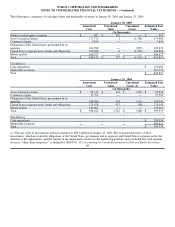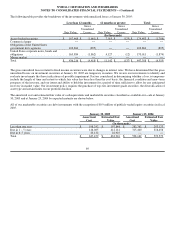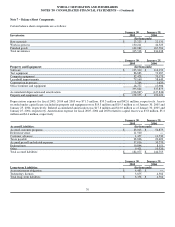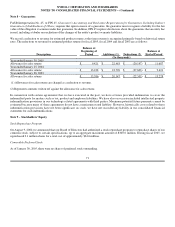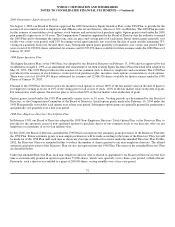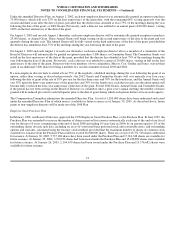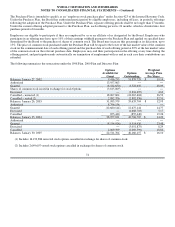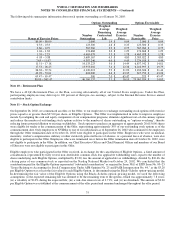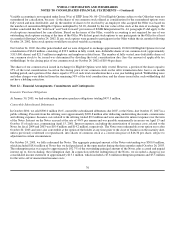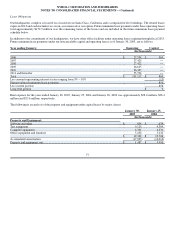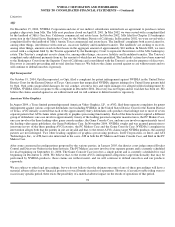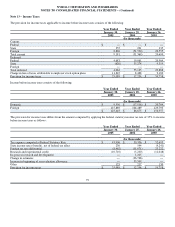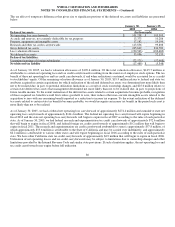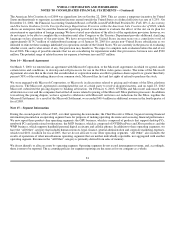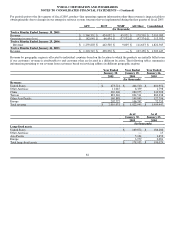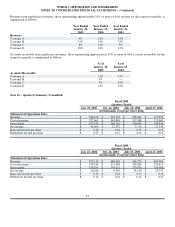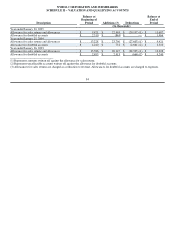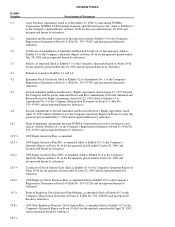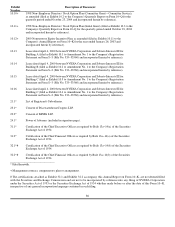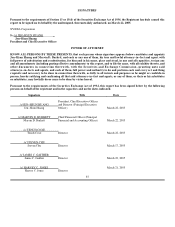NVIDIA 2005 Annual Report Download - page 84
Download and view the complete annual report
Please find page 84 of the 2005 NVIDIA annual report below. You can navigate through the pages in the report by either clicking on the pages listed below, or by using the keyword search tool below to find specific information within the annual report.
NVIDIA CORPORATION AND SUBSIDIARIES
NOTES TO CONSOLIDATED FINANCIAL STATEMENTS − (Continued)
Litigation
3dfx
On December 15, 2000, NVIDIA Corporation and one of our indirect subsidiaries entered into an agreement to purchase certain
graphics chip assets from 3dfx. The 3dfx asset purchase closed on April 18, 2001. In May 2002, we were served with a complaint filed
by the landlord of 3dfx's San Jose, California commercial real estate lease. In October 2002, 3dfx filed for Chapter 11 bankruptcy
protection in the United States Bankruptcy Court for the Northern District of California. In December 2002, we were served with a
complaint filed by the landlord of 3dfx's Austin, Texas commercial real estate lease. The landlords' complaints both assert claims for,
among other things, interference with contract, successor liability and fraudulent transfer. The landlords' are seeking to recover,
among other things, amounts owed on their leases in the aggregate amount of approximately $10 million. In March 2003, we were
served with a complaint filed by the Trustee appointed by the Bankruptcy Court to represent the interests of the 3dfx bankruptcy
estate. The Trustee's complaint asserts claims for, among other things, successor liability and fraudulent transfer. The Trustee's
complaint seeks additional payments from us, the amount of which has not been quantified. The landlords' actions have been removed
to the Bankruptcy Court from the Superior Court of California and consolidated with the Trustee's action for purposes of discovery.
Discovery is currently proceeding and no trial date has been set. We believe the claims asserted against us are without merit and we
will continue to defend ourselves vigorously.
Opti Incorporated
On October 19, 2004, Opti Incorporated, or Opti, filed a complaint for patent infringement against NVIDIA in the United States
District Court for the Eastern District of Texas. Opti asserts that unspecified NVIDIA chipsets infringe five United States patents held
by Opti. Opti seeks unspecified damages for our conduct, attorneys fees and triple damages for alleged willful infringement by
NVIDIA. NVIDIA filed a response to this complaint in December 2004. Discovery has not begun and no trial date has been set. We
believe the claims asserted against us are without merit and we will continue to defend ourselves vigorously.
American Video Graphics
In August 2004, a Texas limited partnership named American Video Graphics, LP , or AVG, filed three separate complaints for patent
infringement against various corporate defendants (not including NVIDIA) in the United States District Court for the Eastern District
of Texas. AVG initially asserted that each of the approximately thirty defendants sells products that infringe one or more of seven
separate patents that AVG claims relate generally to graphics processing functionality. Each of the three lawsuits targeted a different
group of defendants; one case involves approximately twenty of the leading personal computer manufacturers, the PC Makers Case,
one case involves the three leading video game console makers, the Game Console Case, and one case involves approximately ten of
the leading video game publishers, the Game Publishers Case. In November 2004, NVIDIA sought and was granted permission to
intervene in two of the three pending AVG lawsuits, the PC Makers Case and the Game Console Case. NVIDIA's complaint in
intervention alleges both that the patents in suit are invalid and that, to the extent AVG's claims target NVIDIA products, the asserted
patents are not infringed. Two other leading suppliers of graphics processing products, Intel Corporation, or Intel, and ATI
Technologies, Inc., or ATI, have also intervened in the cases, ATI in both the PC Makers and Game Console Case, and Intel in the PC
Makers Case.
After some consensual reconfigurations proposed by the various parties, in January 2005, the district court judge entered Docket
Control and Discovery Orders in the three lawsuits. The PC Makers case now involves four separate patents and is currently scheduled
for trial beginning on September 11, 2006. The Game Console Case involves a single patent and is currently scheduled for trial
beginning on December 4, 2006. We believe that, to the extent AVG's infringement allegations target functionality that may be
performed by NVIDIA products, those claims are without merit, and we will continue to defend ourselves and our products
vigorously.
We are subject to other legal proceedings, but we do not believe that the ultimate outcome of any of these proceedings will have a
material adverse effect on our financial position or overall trends in results of operations. However, if an unfavorable ruling were to
occur in any specific period, there exists the possibility of a material adverse impact on the results of operations of that period.
78


